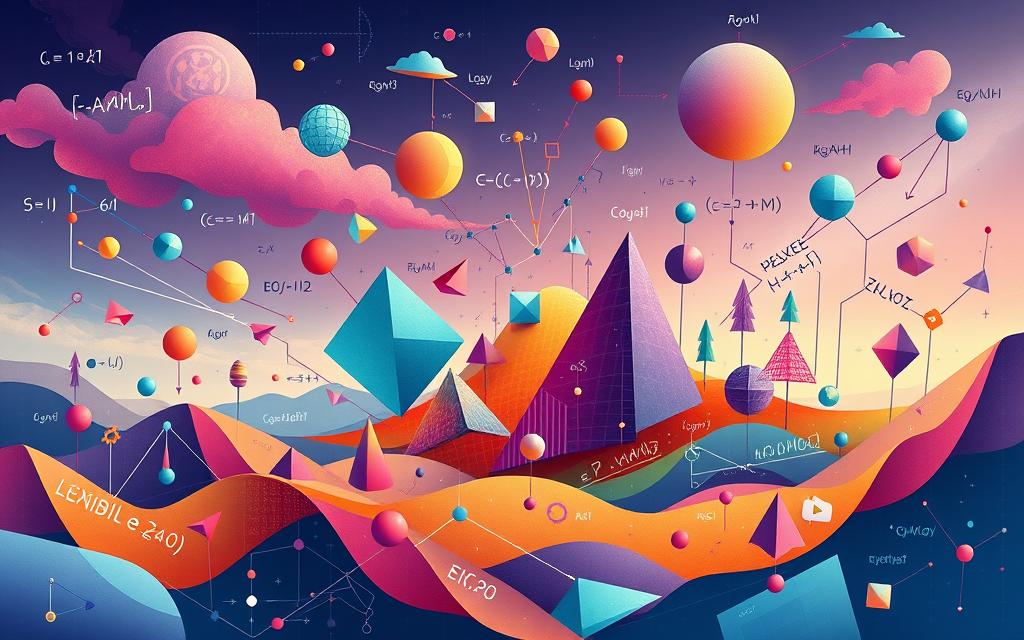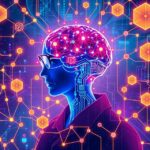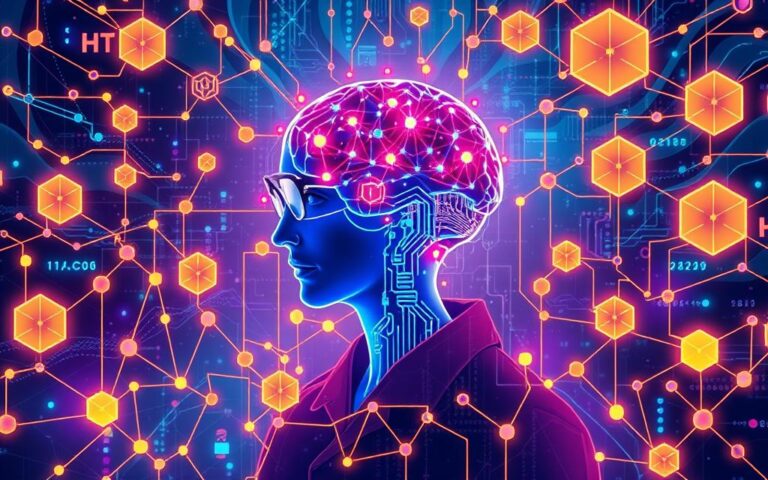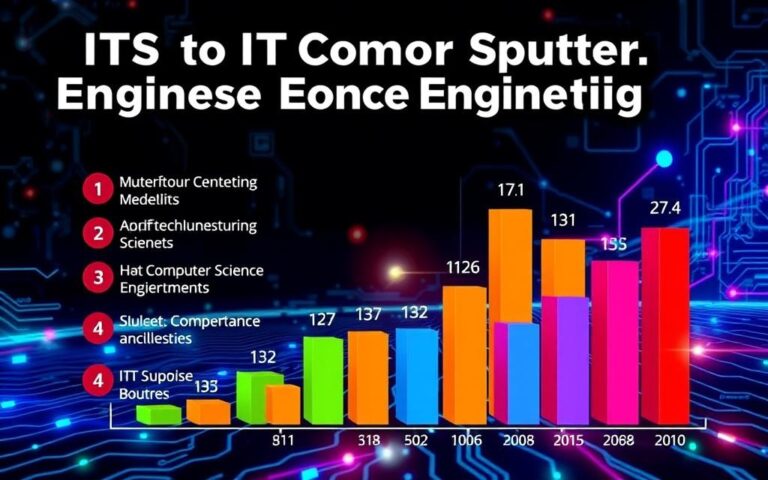Do You Need Math for Computer Science? Debunking the Myths
Many think computer science needs advanced math skills. But is this true? The link between math and computer science is complex. The fear of math shouldn’t stop you from exploring this field.
Math and coding need different skills. Many successful developers come from non-computer science backgrounds. This shows that various paths can lead to a fulfilling career in computer science.
As we explore computer science, we see math isn’t the only need. In fact, 51% of developers say creativity is key in coding. This shows computer science is more than math; it’s about solving problems and innovating.
With open-source software and teamwork, computer science is becoming more open.
In this article, we’ll look at the math needed for computer science. We’ll cover essential math concepts and career options. We’ll also talk about how 37% of developers are self-taught and 63% believe mastering many programming languages is key.
By looking at math, programming, and coding together, we aim to encourage you to consider computer science. We want to show that math is not a barrier to entering this field.
The Common Fear: Mathematics in Computer Science
Many students feel scared of math in computer science. But this fear often comes from not understanding it well. Only 33% of eighth-graders are good at math, as shown by a 2017 report. This lack of skill can make students anxious about math, which might stop them from choosing computer science.
But, it’s important to know the truth about math in computer science. Math is key in computer science, but it’s not too hard to learn. Many students choose computer science because they love coding, not just because they’re good at math. With the right mindset and help, students can beat their math anxiety and do well in computer science.
Why Students Feel Intimidated
Students often think they need to be super good at math to do computer science. But, this isn’t always true. Math in computer science is more about practical skills than theory. Students who enjoy coding can learn the math they need as they go, without needing to be experts first.
Understanding the Root of Math Anxiety
Math anxiety comes from many things, like not understanding math, fearing failure, or lacking confidence. To get over math anxiety, students need to tackle these problems. They should look for extra help, like online tutoring or study groups, and practice math regularly. This builds confidence and makes math easier.
Separating Fact from Fiction
It’s key to know what’s real and what’s not about math in computer science. Math is important, but it’s not everything. Students who love coding can do well in computer science, even if they’re not super good at math. By facing their math anxiety and solving the underlying problems, students can overcome their fears and do well in computer science.
| Myth | Fact |
|---|---|
| I need to be a math genius to study computer science | While math is used in computer science, it is not the only aspect, and students who are interested in programming and coding can stil succeed |
| I need to have a strong math background to study computer science | Students can learn the math they need to know as they go, not needing a strong math background before starting |
Do You Need Maths to Study Computer Science? The Truth Revealed
Many think you need lots of math to study computer science. But, the truth is, you don’t need as much math as you might think. You can learn to program and code by doing it, not just by knowing math.
As this article points out, math is key in computer science. But, other skills like solving problems and thinking logically are just as important. Many computer science courses focus on doing things, like programming and making software, more than just math.
Here are some ways math is used in computer science:
- Algorithms and data structures
- Computer graphics and game development
- Machine learning and artificial intelligence

In short, math is vital for computer science. But, you can learn to code and make software with practice, even if you’re not great at math.
Essential Mathematical Concepts in Computer Science
Computer science heavily relies on math, including discrete math, Boolean algebra, calculus, and linear algebra. These areas are key to creating efficient algorithms and software systems.
Understanding discrete math is vital in computer science. It covers topics like graphs and number theory. Boolean algebra is used in digital electronics and programming for logical operations.
Key Mathematical Concepts
- Discrete mathematics: logic, set theory, combinatorics, graph theory, and discrete probability
- Boolean algebra: digital electronics, computer programming, and logical operations
- Calculus: optimization problems, modeling dynamic systems, and simulations
- Linear algebra: data representation, optimization, and deep learning operations
Calculus and linear algebra are also key in computer science. They are used in machine learning and data analysis. By mastering these, students can solve real-world problems creatively.
As computer science grows, so does the need for math. By focusing on discrete math, Boolean algebra, calculus, and linear algebra, students can excel in the field. They will drive innovation in the future.
Programming Without Advanced Mathematics: Is It Possible?
Many people want to program and code, but think they need advanced math skills. But, you can do well in computer science without being a math whiz. Languages like Python, Ruby, and JavaScript are easier to learn and don’t need much math.
When starting to program without advanced math, focus on:
- Basic problem-solving skills
- Logical thinking and reasoning
- Familiarity with programming concepts and data structures
Online resources and communities offer great help and advice. With hard work, patience, and persistence, you can become a skilled programmer. You can succeed in computer science without needing advanced math.

Begin with small projects and practice solving problems. This way, you can improve your programming skills and lay a solid foundation in computer science. While advanced math is needed for some areas, like AI and machine learning, basic math is enough for many tasks.
| Programming Language | Math Requirements |
|---|---|
| Python | Basic math skills |
| Ruby | Basic math skills |
| JavaScript | Basic math skills |
Real-world Applications: Where Math Meets Code
In computer science, math is key in many areas, like game development and graphics. It uses math, like linear algebra and calculus, to make graphics look real and games feel real. For example, binary and hexadecimal systems help in handling game data.
Math also plays a big role in data science and machine learning. It helps in understanding and making sense of big data. This way, we can find important insights and make better choices. Techniques like linear programming and dynamic programming make these processes more efficient.

| Area | Mathematical Concepts |
|---|---|
| Game Development | Linear Algebra, Calculus, Geometry |
| Data Science | Statistics, Probability, Linear Algebra |
| Algorithm Optimization | Linear Programming, Dynamic Programming, Graph Theory |
In summary, math and code together lead to big changes in fields like game development, data science, and optimization. By using math, developers can make things more efficient and real. This changes how we live and work.
Building Your Mathematical Foundation for CS
Foundational math skills are key to grasping complex algorithms and developing software. Math offers the theoretical base and problem-solving skills needed for programming and coding. It’s important to understand math concepts deeply, not just memorize formulas.
A solid math foundation helps computer scientists tackle complex problems. It enables them to propose solutions and drive innovation. The link between math and computer science is vital for success in tech fields.
Math is applied in many CS areas, such as:
- Software development
- Data analysis
- Algorithm optimization
36 comments show the significance of math in computer science. They highlight the importance of a strong math base for CS success. This foundation is essential for programming and coding.
Building a strong math foundation is key to excelling in computer science. It covers programming, coding, and data analysis. With hard work and dedication, anyone can master the math needed for CS.
| Area of CS | Math Requirement |
|---|---|
| Software Development | Basic math concepts |
| Data Analysis | Statistical analysis |
| Algorithm Optimization | Advanced math concepts |
Alternative Approaches to Learning Computer Science
With a 21% growth rate in Computer and Information Research Scientist jobs by 2031, finding new ways to learn computer science is key. Many students worry about the math, but there are methods that focus on self-paced learning and project-based learning.
Alternative approaches offer several benefits:
- Flexibility: Self-paced learning lets students learn at their own speed. They use online resources and tools to help them.
- Practical experience: Project-based learning gives students real-world experience. It helps them develop skills that are useful in actual jobs.
- Accessibility: These methods make computer science more open to students who missed out on high school courses.
By using online resources and tools, students can get the skills and knowledge for computer science. Even without a strong math background, anyone can learn computer science and start a career in this field.
| Approach | Benefits |
|---|---|
| Self-paced learning | Flexibility, accessibility |
| Project-based learning | Practical experience, skill development |
Success Stories: Thriving in CS Without Being a Math Genius
Many people have done well in computer science without being great at math. This shows that math isn’t the only thing needed to succeed in this field. A discussion on computer science and math has revealed many success stories. These stories are from people who have done great in programming and computer science without being math experts.
These success stories prove that hard work and dedication can lead to success in programming and computer science. You don’t need to be a math genius to do well.
Industry Professional Perspectives
Experts in the field have shared their views on the role of math in computer science. They agree that math is important but not the only thing that matters. Skills in programming, problem-solving, and creativity are also key to success.
Different Paths to Success
There are many ways to succeed in computer science, and not all of them need a strong math background. Some people have learned through self-paced learning, online courses, and practical projects. Others have excelled in areas like front-end development, UX/UI design, and software testing, which don’t always require advanced math skills.
- Self-paced learning methods
- Practical project-based learning
- Online resources and tools
These success stories show that with the right approach, anyone can do well in computer science without being a math genius. Programming and computer science can be open to everyone.
Strengthening Your Math Skills for Computer Science
To do well in computer science, you need to be good at math. Mathematics is key in computer science, and problem-solving skills are vital for coding. Many in computer science find math hard, showing that learning styles differ a lot.
Stories from others show that hard work can improve math skills, even if you find it tough at first. It’s suggested to use online tools like Coursera, Edx, and Khan Academy to help with math. Focus on areas such as:
- Discrete mathematics
- Boolean algebra
- Basic calculus and linear algebra
Improving in these areas can boost your math skills and help in computer science.
There were talks about how online learning can affect math education. It’s clear that learning should be tailored to each person. The effort to learn math for computer science is worth it. With the right effort and tools, anyone can get better at math and thrive in computer science, leading to a fulfilling career in programming and coding.
Career Paths That Require Minimal Mathematical Expertise
Math is key in computer science, but not all jobs need lots of math. BloomTech says most coding jobs don’t need deep math knowledge. Instead, skills like critical thinking and problem-solving are more important. This means people who love computer science but aren’t great at math can find jobs.
Careers like front-end development, UX/UI design, and software testing don’t need lots of math. These jobs focus on creativity, making things easy for users, and checking software quality.
Exploring Career Options
- Front-end development: Creates the look and feel of websites and apps, needing HTML, CSS, and JavaScript skills.
- UX/UI design: Makes interfaces that are easy and fun to use, focusing on how people behave and design.
- Software testing: Checks if software works right and is bug-free, using testing tools and methods.
These jobs are rewarding and in high demand. With the computer science field growing, there are many chances to find a good fit, even if math isn’t your thing.
| Career Path | Primary Skills Required | Math Requirement |
|---|---|---|
| Front-end Development | HTML, CSS, JavaScript | Basic algebra, logic |
| UX/UI Design | Design principles, human behavior | Minimal |
| Software Testing | Testing methodologies, tools | Basic math, logic |
Conclusion: Embracing Computer Science Beyond the Numbers
Mathematics is key in computer science, but it’s not all about numbers and equations. The field is much wider, covering creative, problem-solving, and analytical skills.
These skills go beyond traditional math. They are the building blocks for computer scientists to solve real-world problems. By seeing computer science in this light, students can reach their full capacity and enjoy their work in tech.
It doesn’t matter if you’re good at math or not. What’s important is to be open-minded and eager to learn. With technical skills, creativity, and critical thinking, you can make computer science a rewarding career. It’s more than just numbers.
FAQ
Do you need advanced math to study computer science?
No, you don’t need advanced math to study computer science. Some math is key, but it’s not as hard as people think. Many programmers have done well without being math experts.
What are the essential mathematical concepts in computer science?
Key math concepts in computer science include discrete math, Boolean algebra, and basic calculus. These are used in designing algorithms, data structures, and software.
Is it possible to become a programmer without advanced mathematics?
Yes, you can be a successful programmer without advanced math. Math is part of programming, but many areas like front-end development and UX/UI design need less math.
How can I build a strong mathematical foundation for computer science?
To build a strong math base for computer science, focus on discrete math, Boolean algebra, and calculus. Use self-learning, projects, and online tools to improve.
Can you share success stories of individuals who have thrived in computer science without being math experts?
Yes, many have succeeded in computer science without being math geniuses. Their stories show that success in computer science doesn’t always need advanced math.
What tips can you provide for strengthening math skills for computer science?
To boost your math skills for computer science, concentrate on discrete math, Boolean algebra, and calculus. Practice regularly, look for extra resources, and consider getting help from a mentor or tutor.














